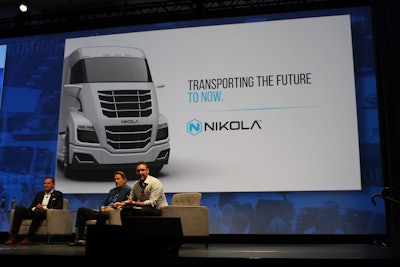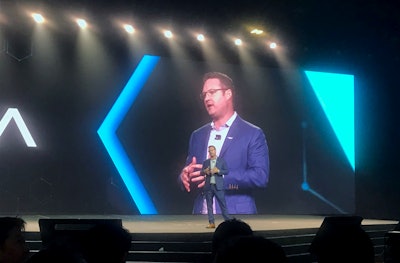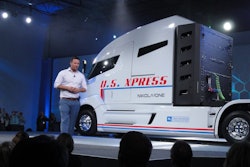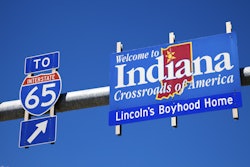
In September 2016, I profiled an up-and-coming trucking entrepreneur whose name probably didn’t immediately resonate.
 Nikola Motor Company CEO Trevor Milton founded natural gas fueling system designer dHybrid Systems and sold it to Worthington Industries in 2014.
Nikola Motor Company CEO Trevor Milton founded natural gas fueling system designer dHybrid Systems and sold it to Worthington Industries in 2014.At the time, serial entrepreneur Trevor Milton was best known as “the guy who said he’s going to build a 2,000-hp tractor.” Fast forward 42 months, and the truck’s power output is a little less eye-popping but a lot more practical – up to 2,000 lb.-ft. torque with up to 1,000 hp.
With partners like Iveco, Ryder, Wabco and Bosch in-tow, in a little less than four years Milton – who founded natural gas fueling system designer dHybrid Systems and sold it to Worthington Industries in 2014 – has delivered on practically everything he said back then, and you can make a case that he’s overdelivered.
For Nikola Motor Company (NMC), a firm that was widely panned as “vaporware” in 2016, credibility has done nothing but pile up.
“There is a unique personality to entrepreneurs that succeed,” Milton said. “When their backs are against the wall, they are more focused and honed in than ever before. That pressure motivates them and brings out the very best in them. That is how I was. When people said that about me, it made me want it more. I enjoy helping people come to terms with their silly accusations and labels. It is part of what feeds my desire to change the world for the better. Very few people ever thought we would be here, and I am glad we are an example for other startups that you shouldn’t listen to them.”
The U.S. Department of Energy (DOE) late last summer awarded NMC a $1.7 million grant to advance its research into fuel-cell-membrane electrode assembly. Nikola’s hydrogen station partner, NEL Hydrogen of Oslo, Norway, also was awarded $2 million from DOE.
In partnership with Anheuser-Busch and BYD Motors, NMC in November assisted with the first zero-emissions beer delivery in the brewer’s hometown of St. Louis. Nikola’s hydrogen-electric truck picked up the load of beer and delivered it to Anheuser-Busch local wholesaler partner Lohr Distributors, marking the first commercial delivery using a Nikola hydrogen-electric vehicle.
In February, NMC debuted an electric pickup truck, the Badger, which features an estimated range of up to 600 miles while delivering 980 lb.-ft. of torque, 906 peak horsepower (455 continuous horsepower) and a towing capacity of more than 8,000 pounds.
Milton uprooted his once-fledgling company from Salt Lake City and moved south to Arizona, where he’s picked a 500-acre site on the west side of Phoenix to erect a 1 million-square-foot facility and this month led his business to the brink of a more than $3 billion public offering on the NASDAQ.
Looking back on it all, Milton joked that he sometimes wonders “how I didn’t screw it all up.”
“There are so many decisions you can make, and it only takes one bad one to derail the entire thing,” he said. “I guess a lot of my past companies, some successes and some failures, have prepared me for this. I wouldn’t be ready to make those decisions if I had not had the history of learning already on a smaller scale. I am very taken aback every time I think about where we are today and how we got here. Nothing short of a miracle and hard work.”
Milton and his company created the conversation about hydrogen while the rest of the industry was focused on platooning and driverless trucks, and when attentions en masse turned to electrification, he doubled down.
“I always tell people that Toyota created the fuel cell for mass adoption and Nikola sold the fuel cell for mass adoption,” he said. “Their marketing sucks, and it takes a new, innovative, crazy, fun company like Nikola to change the hearts and minds of the world. By showing the chicken and the egg could be cheaper than diesel, we got fleets on board. Toyota never learned how to solve the problem of making it cost-effective. Nikola did. Now the whole world believes in hydrogen.”
The one thing Milton has yet to do is actually deliver a truck, but Nikola expects to launch its battery-electric truck to the urban pickup-and-delivery segment next year, with long-haul fuel-cell trucks to follow.
Nikola’s business model supplies both the truck and hydrogen fueling infrastructure, and Milton sees the complete lack of hydrogen infrastructure as a path to the kind of success that natural gas and other alternative fuels never enjoyed.
“You get to start from scratch and learn everything wrong that everyone else did,” he said. “With hydrogen, you are able to solve multiple problems – grid balancing, green energy, cost of production, building only on routes that are pre-sold with trucks. No one thought of that when they were building out the CNG market. They dabbled in it, but never full vertical integration, which is key.”
With a range of about 750 miles, the number of fuel-cell trucks currently on NMC’s books – around 14,000 – is on par with all the Class 8 units ordered in February across all OEMs.












